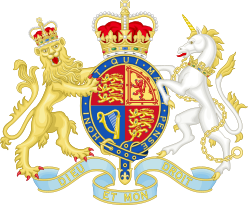Charles Abbott, 1. Baron Tenterden
Charles Abbott, 1. Baron Tenterden PC SL (* 7. Oktober 1762 in Canterbury; † 4. November 1832 in London) war ein britischer Jurist.[1]
Leben
Er war Sohn von John Abbott und dessen Ehefrau Alice. In seiner Jugend galt er als fleißiger Schüler mit gutem Benehmen. 1802 legte er die auch später noch maßgebliche Veröffentlichung Law relative to Merchant Ships and Seamen zum Recht der Handelsschifffahrt vor. 1816 wurde er zum Knight Bachelor geschlagen. Vom 4. November 1818 bis zum 4. November 1832 bekleidete er das Amt des Lord Chief Justice. In dieser Zeit war er 1820 Vorsitzender im Prozess gegen Arthur Thistlewood. Am 30. April 1827 wurde er zum Baron Tenterden, of Hendon in the county of Middlesex erhoben. Im britischen Oberhaus gehörte er der Fraktion der Tories an.
Er heiratete am 30. Juli 1795 Mary Lamotte. Das Ehepaar hatte zwei Söhne und zwei Töchter: John, Charles, Mary und Catherine.
Literatur
- Tenterden, Charles Abbott, 1st Baron. In: Encyclopædia Britannica. 11. Auflage. Band 26: Submarine Mines – Tom-Tom. London 1911, S. 635 (englisch, Volltext [Wikisource]).
- John Macdonell: Abbott, Charles (1762–1832). In: Leslie Stephen (Hrsg.): Dictionary of National Biography. Band 1: Abbadie – Anne. MacMillan & Co, Smith, Elder & Co., New York City / London 1885, S. 26–29 (englisch, Volltext [Wikisource]).
Weblinks
- Charles Abbott, 1st Baron Tenterden auf thepeerage.com
- Charles Abbott im Hansard (englisch)
Einzelnachweise
- ↑ Michael Lobban: Abbott, Charles, first Baron Tenterden (1762–1832). In: Henry Colin Gray Matthew, Brian Harrison (Hrsg.): Oxford Dictionary of National Biography, from the earliest times to the year 2000 (ODNB). Oxford University Press, Oxford 2004, ISBN 0-19-861411-X, (oxforddnb.com Lizenz erforderlich), Stand: 2004
| Vorgänger | Amt | Nachfolger |
|---|---|---|
| Titel neu geschaffen | Baron Tenterden 1827–1832 | John Abbott |
| Personendaten | |
|---|---|
| NAME | Abbott, Charles, 1. Baron Tenterden |
| ALTERNATIVNAMEN | Abbott, Charles 1. Baron Tenterden |
| KURZBESCHREIBUNG | britischer Jurist |
| GEBURTSDATUM | 7. Oktober 1762 |
| GEBURTSORT | Canterbury |
| STERBEDATUM | 4. November 1832 |
| STERBEORT | London |
Auf dieser Seite verwendete Medien
Autor/Urheber: Sodacan, Lizenz: CC BY-SA 3.0
Royal Coat of Arms of the United Kingdom of Great Britain and Northern Ireland in the style used by the Government of Queen Elizabeth II from 1952 to 2022 (as used in all places except Scotland).
| “ | Quarterly, First and Fourth Gules three lions passant guardant in pale Or armed and langued Azure (for England), Second quarter Or a lion rampant within a double tressure flory counter-flory Gules (for Scotland), Third quarter Azure a harp Or stringed Argent (for Ireland), the whole surrounded by the Garter; for a Crest, the imperial crown Proper; for Supporters, dexter a lion rampant guardant Or crowned as the Crest, sinister a unicorn Argent armed, crined and unguled Proper, gorged with a coronet Or composed of crosses patée and fleurs de lys a chain affixed thereto passing between the forelegs and reflexed over the back also Or; Motto 'Dieu et mon Droit’ ('God and my Right') below the shield. | ” |
- PINCHES, J.H & R.V., The Royal Heraldry of England, 1974, Heraldry Today.



